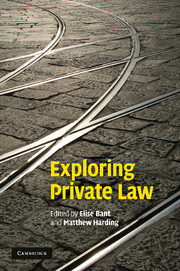Book contents
- Frontmatter
- Contents
- List of Contributors
- Foreword
- Acknowledgments
- Table of Cases
- Table of Legislation
- Introduction
- I Method
- II Unjust enrichment
- 7 The impact of legal culture on the law of unjustified enrichment: the role of reasons
- 8 Natural obligations and unjust enrichment
- 9 Causality and abstraction in the common law
- 10 Trust and theft
- III Equity and trusts
- IV Remedies
- Index
- References
7 - The impact of legal culture on the law of unjustified enrichment: the role of reasons
Published online by Cambridge University Press: 10 November 2010
- Frontmatter
- Contents
- List of Contributors
- Foreword
- Acknowledgments
- Table of Cases
- Table of Legislation
- Introduction
- I Method
- II Unjust enrichment
- 7 The impact of legal culture on the law of unjustified enrichment: the role of reasons
- 8 Natural obligations and unjust enrichment
- 9 Causality and abstraction in the common law
- 10 Trust and theft
- III Equity and trusts
- IV Remedies
- Index
- References
Summary
Introduction
Culture is a word with a variety of meanings. In this contribution we adopt Hofstede's definition of culture, namely that it consists of ‘all the learnt patterns of thinking and acting’ in a particular group, or, in slightly different words, ‘the collective programming of the mind which distinguishes the members of one group or category of people from another’. That said, we are interested here not in culture per se but specifically in legal culture: for present purposes we define legal culture as the collective habits of thought and action amongst legal opinion-makers – the lawyers, judges and academics in a particular legal system – as well as amongst those who use the legal system or are subjected to it. The legal culture of a jurisdiction is created by a great many different societal forces, such as historical accident, political imperatives (including commitment to democracy and human rights), appetite for change coupled with a degree of tolerance of uncertainty, and attitudes towards corruption. That culture, in turn, has a direct bearing on the substantive rules of law that emerge within the system. In this contribution we use one aspect of legal culture, namely the culture of giving reasons in judgments, to investigate how legal culture shapes substantive law, specifically the law of unjust (or unjustified) enrichment. We consider the law of unjustified enrichment in two countries in particular, South Africa and France, with some reference also to the law of England and Germany.
- Type
- Chapter
- Information
- Exploring Private Law , pp. 153 - 174Publisher: Cambridge University PressPrint publication year: 2010

